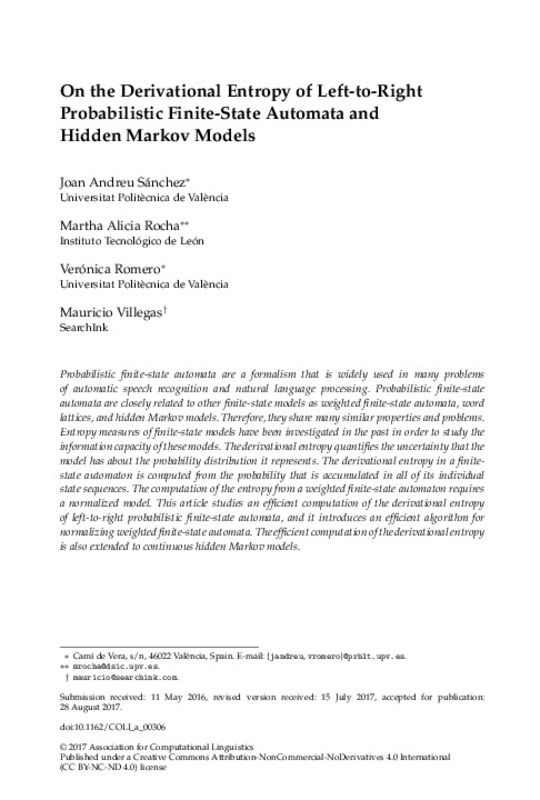Abney, S., McAllester, D., & Pereira, F. (1999). Relating probabilistic grammars and automata. Proceedings of the 37th annual meeting of the Association for Computational Linguistics on Computational Linguistics -. doi:10.3115/1034678.1034759
Bakis, R. (1976). Continuous speech recognition via centisecond acoustic states. The Journal of the Acoustical Society of America, 59(S1), S97-S97. doi:10.1121/1.2003011
Can, D., & Saraclar, M. (2011). Lattice Indexing for Spoken Term Detection. IEEE Transactions on Audio, Speech, and Language Processing, 19(8), 2338-2347. doi:10.1109/tasl.2011.2134087
[+]
Abney, S., McAllester, D., & Pereira, F. (1999). Relating probabilistic grammars and automata. Proceedings of the 37th annual meeting of the Association for Computational Linguistics on Computational Linguistics -. doi:10.3115/1034678.1034759
Bakis, R. (1976). Continuous speech recognition via centisecond acoustic states. The Journal of the Acoustical Society of America, 59(S1), S97-S97. doi:10.1121/1.2003011
Can, D., & Saraclar, M. (2011). Lattice Indexing for Spoken Term Detection. IEEE Transactions on Audio, Speech, and Language Processing, 19(8), 2338-2347. doi:10.1109/tasl.2011.2134087
Chi, Z. 1999. Statistical properties of probabilistic context-free grammar. Computational Linguistics, 25(1):131–160.
Corazza, A., & Satta, G. (2007). Probabilistic Context-Free Grammars Estimated from Infinite Distributions. IEEE Transactions on Pattern Analysis and Machine Intelligence, 29(8), 1379-1393. doi:10.1109/tpami.2007.1065
Dupont, P., Denis, F., & Esposito, Y. (2005). Links between probabilistic automata and hidden Markov models: probability distributions, learning models and induction algorithms. Pattern Recognition, 38(9), 1349-1371. doi:10.1016/j.patcog.2004.03.020
Hernando, D., Crespi, V., & Cybenko, G. (2005). Efficient Computation of the Hidden Markov Model Entropy for a Given Observation Sequence. IEEE Transactions on Information Theory, 51(7), 2681-2685. doi:10.1109/tit.2005.850223
Huber, M. F., T. Bailey, H. Durrant-Whyte, and U. D. Hanebeck. 2008. On entropy approximation for Gaussian mixture random vectors. In IEEE International Conference on Multisensor Fusion and Integration for Intelligent Systems (MFI), pages 181–188, Seoul.
Ilic, V. M. 2011. Entropy semiring forward-backward algorithm for HMM entropy computation. CoRR., abs/1108.0347.
Kemp, T. and T. Schaaf. 1997. Estimating confidence using word lattices. Eurospeech, pages 827–830, Rhodes.
Mann, G. S. and A. McCallum. 2007. Efficient computation of entropy gradient for semi-supervised conditional random fields. In Proceedings of HLT-NAACL, Companion Volume, Short Papers, pages 109–112.
Mohri, M., Pereira, F., & Riley, M. (2002). Weighted finite-state transducers in speech recognition. Computer Speech & Language, 16(1), 69-88. doi:10.1006/csla.2001.0184
Nederhof, M.-J., & Satta, G. (2008). Computation of distances for regular and context-free probabilistic languages. Theoretical Computer Science, 395(2-3), 235-254. doi:10.1016/j.tcs.2008.01.010
Puigcerver, J., A. H. Toselli, and E. Vidal. 2014. Word-graph and character-lattice combination for KWS in handwritten documents. In International Conference on Frontiers in Handwriting Recognition (ICFHR), pages 181–186, Crete.
Sanchis, A., A. Juan, and E. Vidal. 2012. A word-based naïve Bayes classifier for confidence estimation in speech recognition. IEEE Transactions on Audio, Speech, and Language Processing, 20(2):565–574.
Soule, S. (1974). Entropies of probabilistic grammars. Information and Control, 25(1), 57-74. doi:10.1016/s0019-9958(74)90799-2
Thompson, R. A. (1974). Determination of Probabilistic Grammars for Functionally Specified Probability-Measure Languages. IEEE Transactions on Computers, C-23(6), 603-614. doi:10.1109/t-c.1974.224001
Tomita, M. 1986. An efficient word lattice parsing algorithm for continuous speech recognition. In Proceedings of ICASSP, pages 1569–1572, Tokyo.
Ueffing, N., F. J. Och, and H. Ney. 2002. Generation of word graphs in statistical machine translation. In Proceedings on Empirical Method for Natural Language Processing, pages 156–163, Philadelphia, PA.
Vidal, E., Thollard, F., de la Higuera, C., Casacuberta, F., & Carrasco, R. C. (2005). Probabilistic finite-state machines - part I. IEEE Transactions on Pattern Analysis and Machine Intelligence, 27(7), 1013-1025. doi:10.1109/tpami.2005.147
Wessel, F., Schluter, R., Macherey, K., & Ney, H. (2001). Confidence measures for large vocabulary continuous speech recognition. IEEE Transactions on Speech and Audio Processing, 9(3), 288-298. doi:10.1109/89.906002
Wetherell, C. S. (1980). Probabilistic Languages: A Review and Some Open Questions. ACM Computing Surveys, 12(4), 361-379. doi:10.1145/356827.356829
[-]









